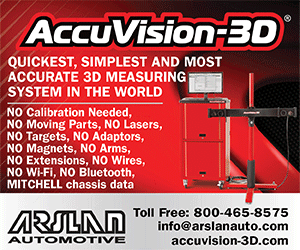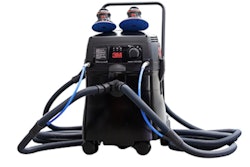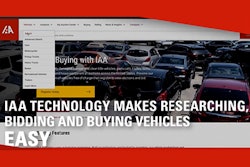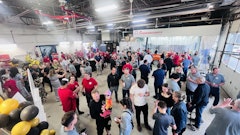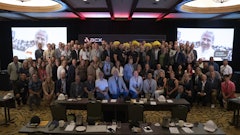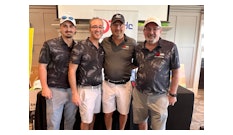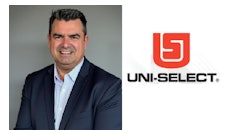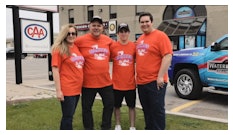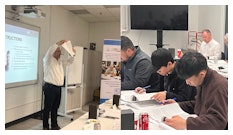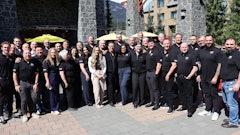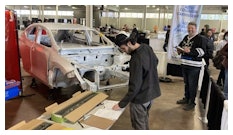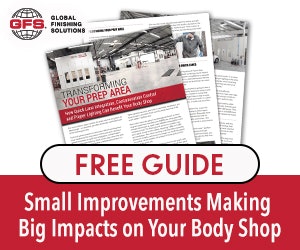
WHY SMART INVESTMENTS IN TECH AND MAINTENANCE OUTSHINE THE SEMA SPECTACLE
Column by STEFANO LIESSI

Of course, you want to make sure you do your research on the item; use a reputable source to consult your purchase and, if you are purchasing at SEMA, make sure it is compatible with CSA requirements. If you do this, make sure it is also serviceable and maintainable through your supplier. All too often purchases are made, then never looked at or maintained again. Year after year I see the same story unfolding. As I go in and out of shops, it never ends.
Me: “What do you think of [INSERT PIECE OF EQUIPMENT HERE]?”
Tech: “Don’t know, haven’t used it.”
Me: “How come?”
Tech: “I dunno. Broken.” I have already figured this out due to the load of dust on it and the fact it’s behind other items that also haven’t seen any love in ages. Let me clarify something: this scenario is far more common than not. Countless times over the years, I have been presented with a poorly maintained welder. Yes—of course the welder is needed for the course. Can you imagine my surprise? Actually, you can’t. I have become somewhat numb to these scenarios.
Here is where the training sessions begin to pay off. I am constantly hearing the same things: “I’ve been doing this for years. Why am I wasting my time?” “My guy is the best; he will pass this no problem.” “We need this for the OE Certification.” “Do you think we can get this wrapped up by noon?” Now, on occasion, I get a tech with this mindset. However, while owners and managers often present this thought process, techs generally want to gain some new knowledge to better themselves; it’s tough to make a living. So, imagine a busy week and a course that needs to be completed. Here we are: a group of techs, a scheduled course and a broken welder. Now what?
As an instructor, I ask how many staff are familiar with the welding application we are testing that particular day. The general reply is, “I did it a few times, used to use it at my other shop.” My answer—“Great, then you will know how we can get around this situation.”
I have already concluded from the condition of the equipment that the experience is little to none; the welder is inoperable, with no backup welder. This is the hidden agenda with training ROI knowledge now; there is more to certification sessions than a plaque on the wall. A good, qualified technician will know when there is something wrong and know how to fix it or find an alternative to get through temporarily—not for two years.
Whenever I host a session, part of the day includes multiple discussions regarding processes, OE procedures, equipment usage, and maintenance. Understanding this is part of certification, the OE assumes and expects it. In this specific example, not all was lost; I was able to set them up and explain how to get around this temporarily, and hopefully, knowledge well retained.
It takes a genuine interest in a subject to retain the pertinent information to achieve constant success; this takes time and effort. It is a lot more than a 15-minute YouTube video. To be completely fair, if you have techs that don’t understand and don’t know the processes and how to use the equipment, and your equipment is inoperable or barely operable, then you are not fixing vehicles correctly or to OE standards…ergo you are not OE certified.
As an instructor or trainer, we can’t be responsible for what you do with the knowledge after the fact. All we can do is try to get you to see the relevance of the information and its relation to your day-to-day business. Consider the vehicle owner; that person has no idea, but we, as an industry, do. The customer relies on the state-of-the-art equipment your ads are touting. They trust you, and that’s why they are there.
What on earth does this have to do with ROI? Quite simply, I am telling you to invest in the right things and get a quicker return on your investment. The right things are your techs and the maintenance of your equipment. You maintain your car to rely on it; so do the same for your equipment; if the tech comes up front and tells you how much you need for a piece of equipment that will ultimately—if used correctly— will improve process, do not reply with, “Do we really need it?” Instead, ask for explanation and attempt to reach a mutual understanding. In my opinion, and you are entitled to my opinion, the smaller investment into your techs and maintenance will prolong the life of the Unicorn Fix-All 2000 and pay back in dividends. You rely on your techs to keep the machine running; your techs rely on the equipment to keep things running; there is absolutely no use in acquiring a new Unicorn Fix-All 2000 if you don’t keep on top of maintaining your equipment and maintaining your techs. Take that investment and clean up your backyard; I bet you would make a way better ROI.
In this scenario, I imparted valuable information to these fine lads, giving them the information to keep the equipment up to par and having them realize that understanding the importance of maintaining the shop’s equipment is part of the value of good training. This will require some investment on the shop’s part, but it is well worth it. When you purchase another ‘Unicorn Fix-All 2000,’ it supplements your maintained equipment instead of replacing it.




